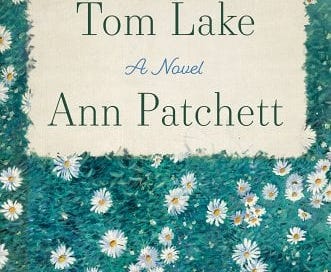TOM LAKE
By Ann Patchett
Literary Fiction
Harper
August 2023
Ann Patchett's latest novel, Tom Lake, which publishes today, is both a thoroughly contemporary story about a family during lockdown, and a demonstration of how timeless the themes in Thornton Wilder's Our Town are.
Lara is a middle-aged mother of three daughters who loves her family, her farm, her life. She is where she is supposed to be and she enjoys every bit of it. Her husband, whose family has farmed their Michigan land for generations, is a good man, a hard-working man, a calm man. Their three grown daughters are all back home because of the new Covid lockdown. They'll need the extra hands because most of the workers who usually come for harvest cannot.
The days are filled with harvesting sweet cherries, which must be done by hand, and hearing the details of when Lara was Emily in a summer stock production of Our Town and knew a famous movie star.
To set the stage properly, she goes back to the time as a school girl when she helps during a community theater audition for Our Town, the quintessential community/school play. All of the Emilys are horrible. Lara loves the play and loves the character, and cannot take it. So she auditions and wins the part. That leads to being seen by a Hollywood producer (who has a niece in the production) and the summer stock acting job. That occurs at Tom Lake, located in a small Michigan town that adores the theater folk and the tourist revenue they bring in. Playing the part of her father is a young man who has star power. Peter Duke is going places. And it looks like he and Lara might get there together.
The girls know the bare bones of the story. There was a spell when the eldest, Emily, named for her mother's Our Town character, thought Duke was her father. She didn't hate her real father, but she was angry with her mother for years. Emily also is the daughter who is determined to be as good a farmer as her real father is, and take over for them so they can enjoy their senior years. She's even going to marry the boy next door, who has never wanted to be anything except a farmer.
The lockdown gives the daughters the chance to nag their mother about every detail, and to be aghast that there were things they didn't know or didn't remember properly. Despite the glamor of the story, Lara is not a glamorous person. She never was, and never wanted to be. She did want to be capable, and doing things like traveling on her own make her feel good. Her husband, Joe, knows the story too. His essential calmness about it all helps keep the novel's tone focused on the characters' essential qualities.
That is but one reflection of Our Town, the one in which living the life one has to the fullest counts, and appreciating the present.
In the play, Emily asks:
“Does anybody realize what life is while they're living it- every, every minute?”
Lara notes early that having her family together at home is a gift:
Nor do I pretend that all of us being together doesn't fill me with joy. I understand that joy is inappropriate these days and still, we feel what we feel.
Later, midway through telling the girls about her summer at Tom Lake, she tells them plainly she has what she wants, and it's not a Hollywood career:
I lift up my hand to the lushness of trees. "Look at this! Look at the three of you. You think my life would have been better spent making commercials for lobster rolls?"
Partway through the novel, it is discovered how interlocking everything in Lara's life is. It was serendipity that she ended up in Tom Lake and that she ended up on a cherry farm, but there is a line from one event to another. This information is one of the sweetest discoveries in the novel. It is an "Oh! Of course!" piece of information. It also reinforces another theme in Our Town -- how important life, marriage and family can be to someone's happiness.
In Our Town, there is the direction to "Choose the least important day in your life. It will be important enough." In Tom Lake, the girls insist their mother choose her favorite day. She chooses her favorite day of that summer, and it is a day that opens up the rest of her ife. It also matters a great deal to most of the other characters. They all regard their destination on a day trip as a bit of heaven on earth, an idyllic place.
Although bad things happen during that summer and beyond, plenty of revelations about the decency of the characters also are described. The worst things one character does is due to alcohol and drug addiction, not to being wicked.
The lockdown brings fear for the future to some family members, but not all of them. As they are able to talk about what is scaring them, the steadfastness of their relatives and the farm help keep the panic button from being pressed. This doesn't mean the fears aren't valid, but it does help put them in perspective when considered from various viewpoints from characters of different ages and personalities.
The ending of Tom Lake is a little twisty compared to the rest of the narrative, but doesn't go off the rails. Ann Patchett is too assured a writer for that to happen. Although Tom Lake is firmly tied to Our Town (even the cemetery is on top of a hill in both), it is not necessary to revisit, or discover, the play before enjoying this beautiful, wise book.




